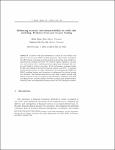Item Infomation
Full metadata record
| DC Field | Value | Language |
|---|---|---|
| dc.contributor | Thi Tra My Nguyen | - |
| dc.contributor.author | Thuy Tien Dinh | - |
| dc.date.accessioned | 2025-08-14T07:43:32Z | - |
| dc.date.available | 2025-08-14T07:43:32Z | - |
| dc.date.issued | 2025 | - |
| dc.identifier.uri | http://thuvienso.thanglong.edu.vn//handle/TLU/13286 | - |
| dc.description.abstract | Accurate credit risk assessment is crucial for the stability and growth of peer-to-peer (P2P) lending platforms. This study investigates the effectiveness of machine learning models in predicting loan defaults using historical Lending Club data. We evaluate logistic regression, decision tree, and random forest, employing feature engineering techniques like one-hot and weight of evidence encoding. Model performance is assessed using K-fold cross-validation and metrics such as accuracy and AUC. To enhance model interpretability, we utilize explainable AI techniques like LIME and SHAP, enabling lenders and borrowers to understand the factors driving loan defaults. Our findings demonstrate that while complex models offer higher predictive accuracy, simpler models like logistic regression with WoE encoding provide a suitable balance between accuracy and interpretability, fostering trust and responsible lending within the P2P lending ecosystem. | vi |
| dc.language.iso | en | vi |
| dc.publisher | Thang Long Journal of Science | vi |
| dc.relation.ispartofseries | Vol. 4 No. 1 (2025) Mathematics and Mathematical Sciences;105-129 | - |
| dc.subject | Peer-to-Peer Lending Credit Risk | vi |
| dc.subject | Assessment Logistic | vi |
| dc.subject | Regression Random | vi |
| dc.subject | Forest Weight of Evidence Encodings | vi |
| dc.title | Balancing Accuracy and Interpretability in Credit Risk Modeling: Evidence from Peer-to-Peer Lending | vi |
| dc.type | Bài báo/Newspaper | vi |
| dc.identifier.doi | https://sciencethanglong.edu.vn | - |
| Appears in Collections | Số 1 Tập C4 - 2025 | |
Files in This Item:



